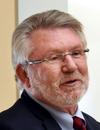By Greg Sterling, Dean of Yale Divinity School
I had just conducted the funeral of a woman who had been a close friend of my wife, Adrian, since the two met on the first day of middle school more than 50 years ago. Anna was only 62 and had died from an aggressive cancer. When we arrived back at the hotel, there was an unthinkable message on the television in the lobby: 20 killed and 26 wounded in El Paso. Having come directly from a funeral of someone who died too young and relatively quickly, I could only imagine the pain and the shock of the families of the 20 people who had been murdered.
It seemed unbelievable that this followed on the heels of the shooting in Gilroy, CA, where three people had been slain and 13 others wounded. But it was not over. Less than 24 hours after the El Paso shooting, a gunman killed at least nine people and wounded another 27 in Dayton, Ohio, the 32nd mass shooting in America this year. Thirty-two innocent people who were simply going about their lives have been slaughtered by these three horrific acts of gun violence in one week.
Questions run through our minds. Why? What can be done? This level of violence was not common in the past. It has become so common—I hesitate to use the word routine—that now people simply speak of “another shooting,” that is, until it happens in our hometown or affects someone we know. While a full analysis needs to be done, there are some things that seem obvious.
First, we are struggling with racism in America. The shooter in El Paso (I will not give the shooter notoriety by using the name) appears to have posted a bald-faced racist statement 20 minutes before the shooting. We need to come to grips with the fact that we have a problem with racism in the US. All of us need to do all that we can to overcome it. We need leaders who will promote tolerance and unity, not fear and isolationism. Intolerance can turn violent, as the killings of the past week have demonstrated.
Second, the shooter in El Paso used a military-style assault weapon. How can we allow the gun lobby the power to protect the sale of weapons that are intended to kill human beings? How can we continue to allow them to be visibly displayed in sporting goods stores, a display that serves as a stimulus for such acts? How can we allow elected representatives to continue to serve who place higher importance on political donations than on the lives of innocent people? Removing assault weapons from legal sales will not end all gun violence, but it will make an important statement. Allowing them to continue to be sold also makes an important statement—one I find anathema.
Third, almost all of the shooters are loners who have either become indoctrinated by racial hatred or have serious mental issues or both. The function of churches is to provide a place where all have a sense of belonging. The increasing loss of community and belonging in American society has major consequences. We need to reach out to those who are marginal and welcome them. If we turn our backs on those who are isolated, we may find that they will turn their aim on us.
Finally, we need to realize that while the problem of gun violence is complex (e.g., there are economic and structural issues at stake that I have not mentioned), there are moral issues at stake. Religious leaders have a role to play in overcoming this plague. I urge every minister to address this problem from the pulpit. I urge every alum to work within their own community to address the issue. I urge every American to vote for those who will work to overcome racism, to eliminate the sale of assault weapons, and to heal a society that is coming apart. I ask all of us to pray for those who have lost loved ones and for our society. I fear that our civil society is becoming uncivilized.
 Greg E. Sterling is The Reverend Henry L. Slack Dean and Lillian Claus Professor of New Testament at Yale Divinity School.
Greg E. Sterling is The Reverend Henry L. Slack Dean and Lillian Claus Professor of New Testament at Yale Divinity School.